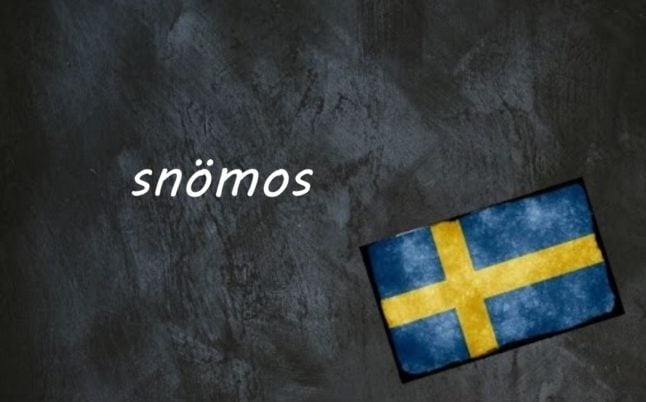Snömos defines two different kinds of snow, which are equally common in Sweden.
Mos means “pulp” or “mash” (you might recognise it from potatismos, meaning “mashed potatoes”) and snömos is the kind of greyish slushy substance that covers the streets a few days after heavy snowfall, where the initial snow has begun to melt and mix together with grit, mud, and dirt from people’s shoes and cars.
There are several other names for what in English is called “slush”. You can also call it snösörja (literally “snow sludge”, which is a beautiful word since sörja as a verb means “to mourn”, giving it a sense of sadness), slask (sludge), or modd (melted snow which is usually mixed with mud).
But confusingly, snömos can also refer to fresh, fluffy snow. There’s a creamy dessert made of egg whites, cream, spices and fruit that is known as snömos too, and if you follow the recipe correctly it should look like fresh snow rather than days-old gritty slush. Sometimes, whipped cream itself is referred to as snömos, especially among Swedish-speaking Finns.
- Don’t miss any of our Swedish words and expressions of the day by downloading The Local’s new app (available on Apple and Android) and then selecting the Swedish Word of the Day in your Notification options via the User button.
Snömos can also be used in a metaphorical sense.
If you say that someone is serving or producing snömos, it means they are talking with beautiful imagery or powerful ideas, but no substance. It’s often used about politicians who offer plenty of rhetoric but less concrete options, or you might use it about a boss who talks about company values that are rarely acted upon, an article that fails to get to the point, or anyone else who uses meaningless phrases or empty promises. The idea behind this image is that the words are similar to fluffy fallen snow: they will soon melt to nothing.
Examples
Hon lovade mycket, men det var bara en massa snömos
She promised a lot, but it was just a load of empty talk
Snön har blivit till snömos
The snow has become slush
Looking for a good idea for a Christmas present?
Villa, Volvo, Vovve: The Local’s Word Guide to Swedish Life, written by The Local’s journalists, is available to order. Head to lysforlag.com/vvv to read more about it. It’s also possible to buy your copy from Amazon US, Amazon UK, Bokus or Adlibris.



 Please whitelist us to continue reading.
Please whitelist us to continue reading.
Member comments